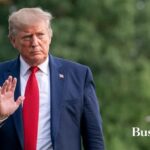China’s top executives are increasingly frustrated by years of failure to develop semiconductors that can replace US circuits. Billions of dollars poured into the industry over the past decade have not produced the kind of breakthroughs that have come from previous national scientific efforts with the way senior government officials think, according to confidants. Tightened restrictions in China could have overwhelmed Beijing and successfully curbed its technological ambitions, they said, asking not to be identified and revealing sensitive considerations. The investigation has rocked a semiconductor industry long accustomed to high-level support. Xi Jinping’s government had allocated more than $100 billion to build a national semiconductor industry to help the country break away from the West, which had become Beijing’s main vehicle for allocating capital to the country’s chipmakers.
The country’s top anti-corruption agency on Tuesday announced investigations into three other executives who have helped manage the Big Fund’s assets, adding that it will send a team to the Ministry of Industry and Information Technology. The same regulatory agency was already investigating Minister Xiao Yaqing, making him the highest-ranking cabinet member to face a disciplinary investigation in nearly four years. “If you invest tens of billions of dollars in an industry, be it high-tech industries or just building trains and airports, they will do illegal business in the future,” said Jordan Schneider, senior analyst at Rhodium Group and host of the China Talk podcast.
The government is investigating Big Fund boss Ding Wenwu, who once warned that it was “unrealistic” to cut corners when developing chip technologies, Semiconductor Manufacturing International Corp. and Yangtze Memory Technologies Co. The fund has largely worked and held behind-the-scenes investment standards out of the public eye, which some analysts say undermines the Communist Party’s potential liability. It increasingly restricts the types of chipmaking equipment US companies can export to Chinese customers and ties in allied countries to allow key suppliers like ASML. Holding NV from the Netherlands and Nikon Corp. from Japan join their tech blockade. This year, various government agencies have begun reviewing contingency plans for strategic industries in the event of tougher US sanctions, the people said. When senior officials examined the report on the chip sector last month, it became clear that progress in the area may have been overblown and that many investments had not paid off, the people said.
That contradicted a longstanding belief that Beijing just needs to pour enough money into the problem. Xi has repeatedly called for breakthroughs in key technologies as the world faces “major changes not seen in a century.” The effort increased in urgency during the Trump administration, which imposed sanctions that have proven effective in crippling Chinese giants, including Huawei Technologies Co. One, or just like building trains and airports, they’re becoming illegal ones doing business,” said Jordan Schneider. Rhodium Group senior analyst and host of the China Talk podcast. The government is investigating Big Fund boss Ding Wenwu, who once warned that it was “unrealistic” to cut corners when developing chip technologies.

Business Talk is a digital business magazine that caters to CEOs, Entrepreneurs, VC, and Corporates. While working with entrepreneurs and business executives, we focus not only on their achievements. Our mission is to shed light on business entities, including their innovations, technological benchmarks, USPs, and milestones/accolades.













